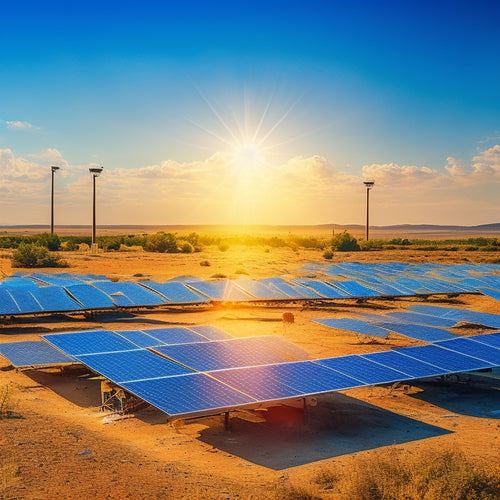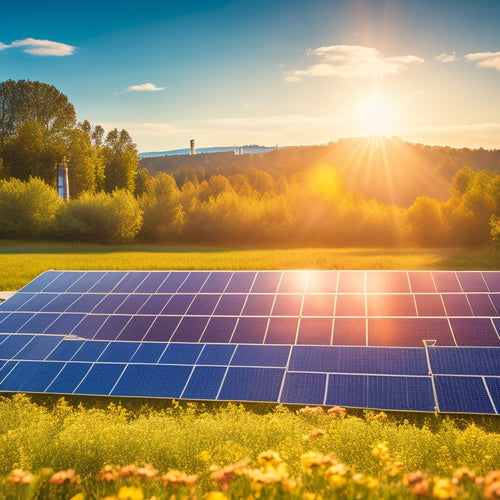
Advantages of Residential Solar Power
Share
Residential solar power provides you with significant advantages. You'll reduce electricity bills by up to $1,800 annually, increasing your financial flexibility. Solar energy enhances your home's value while offering tax incentives that further offset installation costs. Environmentally, it lowers your carbon footprint and promotes sustainable practices. The systems are built to last, requiring minimal maintenance, ensuring reliable performance over decades. Additionally, you gain energy independence, decreasing reliance on the grid and shielding yourself from rising energy prices. Curious about how to maximize these benefits and take the next steps? You'll find more key perspectives just ahead.
At a Glance
-
Switching to solar power can significantly reduce electricity bills, with potential annual savings of up to $1,800.
-
Federal and state tax incentives, along with financing options, make solar installation more affordable and financially beneficial.
-
Residential solar systems decrease carbon emissions and promote environmental sustainability by utilizing a renewable energy source.
-
High-quality solar components are designed for durability and require minimal maintenance, ensuring long-term reliability and performance.
-
Solar power enhances energy independence, reducing reliance on the grid and providing security during outages and price fluctuations.
Cost Savings Over Time
Switching to solar power can markedly reduce your electricity bills, allowing you to redirect those savings towards other essential expenses.
By eliminating energy bills, homeowners can save up to $1,800 per year, which can be reinvested into the household or savings.
Additionally, you can take advantage of various tax incentives that make the initial investment more manageable, such as federal tax credits.
Over time, these financial benefits can lead to substantial cost savings, enhancing your home's value and your budget.
Reduced Electricity Bills
As you employ the power of the sun through residential solar panels, you can greatly reduce your electricity bills over time. By leveraging solar energy, you not only generate your own power but also tap into significant savings. Integrating energy storage solutions allows you to store excess energy for later use, further decreasing reliance on the grid.
Here's a quick comparison showing potential savings with solar power:
| Month | Traditional Bill | Solar Savings | Net Savings |
|---|---|---|---|
| January | $150 | $100 | $50 |
| April | $120 | $80 | $40 |
| July | $180 | $120 | $60 |
| October | $160 | $110 | $50 |
Tax Incentives Available
In addition to the considerable savings on your electricity bills, there are various tax incentives available that can enhance the financial benefits of installing residential solar panels. You can take advantage of federal credits, such as the Investment Tax Credit (ITC), allowing you to deduct a substantial percentage of your installation costs from your federal taxes.
Many states also offer generous rebates and installation grants, providing you with even more savings.
Moreover, solar loans can help you finance your system while still benefiting from tax deductions. As you generate renewable energy, you may earn Renewable Energy Certificates (RECs), which can be sold for extra income.
In addition, property tax exemptions mean your home's value may increase without impacting your property taxes, giving you added financial freedom.
With these incentives, the overall cost of solar installation becomes more manageable, allowing you to invest in your energy independence without financial strain.
By leveraging these tax benefits, you can notably reduce your upfront costs and enhance your return on investment, making the shift to solar power a smart, financially sound decision.
Don't miss out on these opportunities—solar power could be your pathway to freedom from rising energy costs.
Environmental Impact Reduction
By installing residential solar panels, you considerably decrease your carbon footprint, contributing to a cleaner environment.
Solar energy is a renewable resource, meaning it won't deplete and can help reduce reliance on fossil fuels.
Additionally, solar technology is an essential player in the renewable energy sector, offering financial incentives such as financial incentives that enhance the appeal of going solar.
Embracing this technology not only benefits you financially but also plays a key role in combating climate change.
Decreased Carbon Footprint
Many homeowners are finding out how residential solar power can greatly lower their carbon footprint. By utilizing solar energy, you're not just powering your home; you're actively participating in environmental preservation. The higher the solar panel efficiency, the more energy you generate from sunlight, which means less dependence on fossil fuels. This change translates to a significant reduction in greenhouse gas emissions.
When you install solar panels, you contribute to carbon offset benefits. Each kilowatt-hour of solar energy you produce displaces the need for conventional electricity generated by coal or natural gas. As a result, your home becomes a symbol of sustainability, promoting a cleaner atmosphere and a healthier planet.
Moreover, this shift to solar energy aligns perfectly with the desire for freedom—freedom from fluctuating energy prices and reliance on traditional energy sources that contribute to pollution. By choosing solar, you're making a bold statement about your commitment to the environment while achieving energy independence.
Embrace the power of residential solar and take control of your carbon footprint today. The benefits extend beyond your home, impacting your community and the world.
Renewable Energy Source
Utilizing the sun's energy as a renewable source greatly reduces your home's environmental impact.
By capturing solar power, you're tapping into a clean, inexhaustible energy supply that minimizes reliance on fossil fuels. This shift not only decreases greenhouse gas emissions but also promotes a sustainable future for generations to come.
Recent solar technology advancements have made residential solar systems more efficient and affordable than ever.
With solar panels capable of converting more sunlight into electricity, you can considerably lower your utility bills while reducing your carbon footprint.
If you're not ready to invest in a full solar installation, consider community solar programs.
These initiatives allow you to share the benefits of solar energy without needing to install panels on your property. You can support local renewable projects and enjoy the advantages of solar power, all while contributing to a cleaner environment.
System Durability and Longevity
When you invest in a residential solar power system, you're choosing a durable solution built with quality materials designed to withstand various weather conditions.
These systems are engineered to last, with components like solar panel arrays that convert sunlight into electrical energy efficiently. They typically require minimal maintenance, allowing you to enjoy your clean energy source without constant upkeep.
With longevity in mind, a solar installation can provide reliable performance for decades, making it a smart choice for homeowners.
Quality Materials Used
How can the choice of quality materials impact the durability and longevity of your residential solar power system? When you invest in solar energy, selecting high-grade components is essential for maximizing solar panel efficiency.
Quality materials, such as durable glass and sturdy mounting systems, can greatly enhance the lifespan of your solar panels, guaranteeing they withstand harsh weather conditions and last for decades.
Sustainable materials not only contribute to environmental responsibility but also promote resilience in your system. For instance, using corrosion-resistant metals in the frame and high-efficiency photovoltaic cells can prevent degradation and maintain peak performance over time. This means fewer replacements and repairs, ultimately saving you money and stress.
Moreover, systems built with quality materials often come with longer warranties, providing you peace of mind as you adopt energy independence.
Low Maintenance Requirements
With low maintenance requirements, residential solar power systems offer a hassle-free energy solution that enhances their durability and longevity. Once installed, these systems are designed to operate efficiently with minimal upkeep.
Most solar panels come with a warranty of 25 years or more, showcasing their long-term system reliability. You won't need to worry about frequent repairs or replacements, as the sturdy materials used in the installation process are built to withstand harsh weather conditions.
Regular cleaning is usually all that's necessary to keep your panels operating at peak performance, ensuring that dust and debris don't hinder their efficiency. Unlike traditional energy systems, which often require ongoing maintenance and inspections, solar power systems enable you by minimizing your responsibilities.
This means you can focus on enjoying the benefits of clean energy without the burden of constant upkeep. Investing in a solar power system not only enhances your freedom from rising energy costs but also supports sustainability.
Selecting Based on Energy Needs
To effectively select a solar power system, you need to assess your energy consumption patterns first.
Understanding how much energy you use will help you evaluate the appropriate system size required to meet your needs. Conducting an energy audit can reveal high usage areas and potential efficiency improvements, enabling you to optimize your energy usage to create a more efficient renewable system (energy audit observations).
This strategic approach guarantees you maximize efficiency and savings from your solar investment.
Assessing Energy Consumption Patterns
Understanding your energy consumption patterns is essential when selecting a residential solar power system that meets your specific needs. By analyzing your usage trends, you can identify peak hours when your energy demand is highest. This information allows you to optimize your system for energy efficiency, ensuring that your solar power generation aligns with your household habits.
Consider your appliance usage and how it might change with lifestyle adjustments. For instance, if you plan to work from home more often, your energy consumption may increase during daytime hours.
Seasonal variations also play a significant role; air conditioning in summer and heating in winter can drastically affect your energy needs.
Utilizing smart technologies can help you monitor consumption forecasting, enabling you to adjust your energy usage accordingly. This understanding allows for better management of utility rates and can lead to significant savings over time.
Evaluating System Size Requirements
Once you've analyzed your energy consumption patterns, it's time to evaluate the size of the solar power system that will best suit your needs. Proper system sizing is essential for maximizing your energy independence and minimizing wasted resources.
Start by conducting energy forecasting to predict your future energy usage, considering factors like household growth or changes in lifestyle.
To determine the appropriate system size, calculate your average monthly energy consumption in kilowatt-hours (kWh). Divide this figure by the average peak sunlight hours in your area to estimate the required solar panel output. This will guide you in selecting the number of panels needed to meet your energy demands.
Remember, a system that's too small won't provide enough power, while one that's too large can lead to unnecessary costs. Striking the right balance allows you to utilize the sun's energy effectively, giving you the freedom to power your home sustainably.
Investing time in accurate system sizing guarantees that you're not only meeting your current needs but also preparing for future energy demands, ultimately leading to greater savings and energy autonomy.
Higher Energy Independence Potential
When you utilize solar power, you greatly reduce your reliance on the grid.
This independence not only shields you from fluctuating energy prices but also enhances your energy security during outages.
Reduced Reliance on Grid
In today's energy environment, homeowners are increasingly seeking ways to reduce their dependence on the traditional power grid. By investing in residential solar power, you're not just utilizing renewable energy; you're enhancing your energy security and contributing to grid stability. This shift allows you to become less vulnerable to fluctuating energy prices and outages caused by extreme weather or grid failures.
Here's a quick comparison of the benefits:
| Benefit | Description | Impact |
|---|---|---|
| Energy Independence | Generate your own power | Reduced reliance on grid |
| Cost Savings | Lower electricity bills | Increased savings over time |
| Environmental Impact | Decrease carbon footprint | Contributes to sustainability |
Frequently Asked Questions
How Do Solar Panels Affect Home Property Value?
Solar panels can increase your home's resale value considerably. They enhance buyer appeal by showcasing energy efficiency and lower utility costs, making your property more attractive in a competitive market. You'll likely see a solid return on investment.
What Maintenance Is Required for Residential Solar Systems?
To keep your solar system singing, you'll need regular system cleaning, inverter checks, battery maintenance, and panel inspections. Staying proactive guarantees efficiency, longevity, and ultimately, the freedom to utilize the sun's energy without worry.
Are There Tax Incentives for Installing Solar Panels?
Yes, there're federal incentives and state rebates available for installing solar panels. These financial benefits can considerably reduce your initial investment, allowing you to utilize solar energy while enjoying greater independence and savings on energy costs.
Can Solar Power Be Used During Power Outages?
Yes, solar power can provide you grid independence during outages if you've got backup systems in place. With proper setup, you'll capture energy from your panels, ensuring you stay powered even when the grid fails.
How Do Weather Conditions Impact Solar Panel Efficiency?
Weather conditions greatly impact solar panel efficiency. You'll notice solar output drops due to shading issues, temperature effects, humidity levels, and snow accumulation, while ideal panel orientation can enhance performance under varying conditions.
Explore More
To sum up, embracing residential solar power not only enhances your budget by slashing energy costs but also champions a cleaner, greener planet. By choosing a system that suits your specific energy needs, you improve your energy independence and guarantee a sustainable future. With durability and longevity on your side, solar power paves the way for a brighter tomorrow. So, why wait? Explore solar solutions today and enjoy the myriad benefits of this groundbreaking technology!
Related Posts
-

What Happens Without a Charge Controller in Solar Panels
Without a charge controller in your solar panel system, you risk overheating batteries due to overcharging, which can...
-

Advantages of Solar Generating Systems Over Traditional Energy
Solar generating systems provide several key advantages over traditional energy sources. You'll experience lower long...
-

Top 10 Off Grid Camping Gear Must-Haves
When you're off-grid camping, the right gear is crucial for a smooth expedition. Start with a durable, weather-resist...


